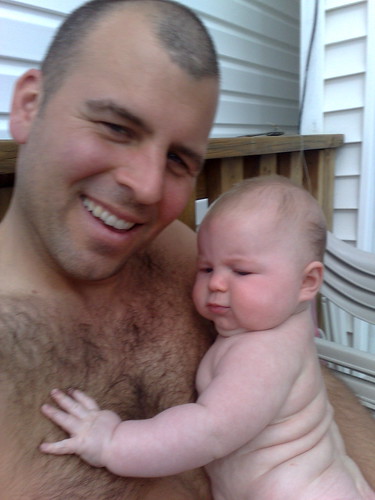
Yesterday, my office had a retreat. We’re in the middle of a messy, stressful workplanning process, so we took a day to relax in the sun (and finalize some of our logframes). During lunch, after the swimming, my colleague A turned to me. I don’t know if it was the vodka or the Tajik sunshine, but he said to me, “I started doing surgery as a medical student. It was the war, and they needed every hand.”
I was pretty sun-dazed myself, and I answered, “Did you save people?”
“Some people,” he said. “Not all of them. I remember every one I lost.”
After that we took the baby swimming for the first time, and then he lay on a towel in the shade, naked and kicking his feet. About 80% of my colleagues are doctors, and an undressed human being was irresistible to them. They’d walk by, stop, and do a brief physical. I now know his eyes are good, he is properly symmetrical, and he’s big for his age. (Actually, I knew all that already, but verification is always nice.) I was quizzed about my breastfeeding practices, my plans for introducing supplementary foods, and where he sleeps.
That led naturally into long conversations about Tajik children. They tend to fall off their growth curve when supplementary food is introduced; parents give them too much bread and not enough food with caloric value. We brainstormed ways to educate mothers, and grandmothers, about feeding young children. We want every baby to be as chunky and happy as my little guy is.
It was a really good day, the kind of day that reminds you why you choose to do this.
Driving home to Dushanbe, I was suntanned and contented and full of plov. When my husband called, I answered the phone happily. He told me that the Ministry of Foreign Affairs won’t renew the baby’s visa on a technicality. The visa expires Saturday. We need to leave the country by then and reapply for the visa from outside the country.
So now we’re scrambling to find a place two American citizens can get to easily from Dushanbe, without a visa, since the baby doesn’t have any visas yet besides the Tajik. (Odds currently favor Frankfurt, though I am pulling for Dubai since I haven’t been there since I was a kid.) It’s going to be expensive, and disrupt my work, and I’ll miss seeing my older son, who comes back from Iowa on Monday. Plus I don’t know how we’ll resolve the visa technicality even from outside the country.
Up, down. That’s the life. It’s worth it, but this sucks.
******
Chosen because when I did a Flickr search for “naked baby” and it gave me a picture of someone I know, it seemed like a sign.

